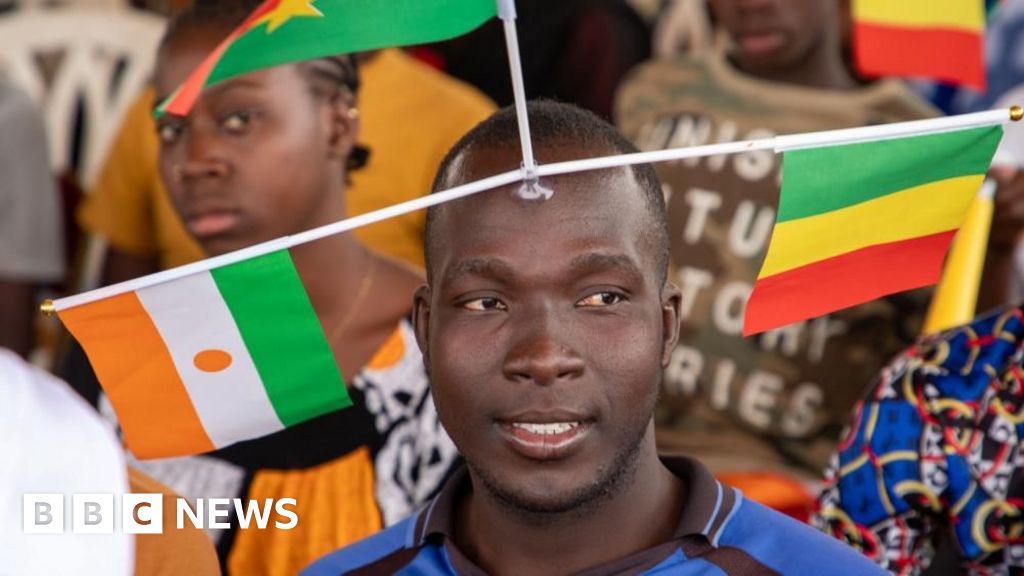Physical Address
304 North Cardinal St.
Dorchester Center, MA 02124
Physical Address
304 North Cardinal St.
Dorchester Center, MA 02124

Leaders of the West African regional grouping Ecowas approved the withdrawal of three military-ruled countries from the bloc but offered them a six-month grace period to reconsider.
Mali, Burkina Faso and Niger plan to withdraw from Ecowas in January after rejecting the bloc’s demand to restore democratic government.
The three outgoing countries were founding members when Ecowas was created in 1975 to improve economic and political integration in West Africa, so this is a blow to what was Africa’s most developed trading group.
Citizens of all ECOWAS countries currently have the right to live and work in all member states, while goods can move freely.
ECOWAS has not yet said whether it will impose restrictions on people and goods from the three outgoing states, which have formed a new grouping, the Alliance of Sahel States (AES, for its French acronym).
The ECOWAS Commission in Abuja is mandated to resolve these issues and how the two blocs should work together in the future.
Over the weekend, the AES announced visa-free travel and residence rights for ECOWAS citizens.
Its leaders said this decision was made in a spirit of friendship and to strengthen centuries-old ties between African peoples.
However, all three countries are poor and landlocked, so most migrants move from them to the wealthier coastal countries of West Africa.
ECOWAS leaders meeting in Nigeria on Sunday said they respected the decision of the three Sahel countries to withdraw, but offered a six-month transition period.
In the period between January 29 and July 29, 2025, the trio may be readmitted to the block if they decide to rejoin the community, says a statement from Ecowas.
Meanwhile, negotiations led by the president of Senegal, Bassirou Diomaye Faye, and the president of Togo, Faure Gnassingbé, will continue.
The military junta has so far refused to remain in the bloc despite efforts to persuade them.
After a ministerial-level meeting on Friday in Niamey, Niger’s capital, the three states said in a joint statement that their decision was “irreversible.”
Their withdrawal would be a serious blow to regional unity and efforts to boost economic and security cooperation.
At the opening of the summit, the head of the ECOWAS commission, Omar Touray, said that his “imminent departure” was “disheartening”, but wanted to “praise the ongoing mediation efforts”, the AFP news agency reported.
With its planned departure, the bloc will lose 76 million of its 446 million inhabitants and more than half of its total geographical area.
In a statement, AES president, Mali’s military ruler Assimi Goïta, said the right of Ecowas citizens to “enter, circulate, reside, settle and leave the territory” of the new bloc would be maintained.
His statement was seen as a signal to ECOWAS leaders that Burkina Faso, Mali and Niger wanted to maintain good relations, despite leaving the bloc.
The three states notified ECOWAS in January 2023 that they would withdraw within a year, complying with the schedule established by the bloc for states that decided to leave.
Relations between the bloc and the three countries have been strained after military coups occurred in Niger in July, Burkina Faso in 2022 and Mali in 2020.
Ecowas condemned the coups and suspended its membership, hoping they would restore civilian government.
But the coup leaders stood their ground and have turned toward Russia.
They accuse Ecowas of being too close to Western powers and are increasingly reliant on Russia to fight armed jihadists waging an insurgency in the region.
Dec. 16 Correction: This article originally described the trio’s plans as the first division in Ecowas. In fact, Mauritania withdrew in 2000, so we have removed this line from the story.